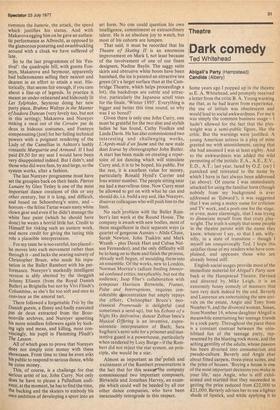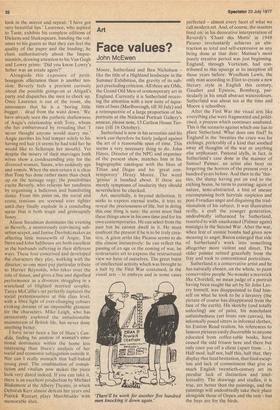Theatre
Dark comedy
Ted Whitehead
Abigail's Party (Hampstead) Candida (Albery) Some years ago I popped up in the theatre as E. A. Whitehead, and promptly received a letter from the critic B. A. Young warning me that, as he had learnt from experience, the use of initials was obsolescent and would lead to social awkwardness. For me it was simply the common business usage — I hadn't allowed for the fact that the playwright was a semi-public figure, like the critic. But the warnings were justified. A young American actress in a play of mine greeted me with astonishment, saying that she had assumed I was at least eighty. And to the awkwardness was added the wild permuting of the initials: E.A., A .E., E.V., ED, A.T.; last year, faced by 0.Z. (sic) I panicked and retreated to the name by which I have in fact always been addressed (as above). Of course I was immediately attacked for using the familiar form (though nobody from my background is ever addressed as `Edward'); it was suggested that I was using a matey name for criticism and TV work, and a posh one for the stage, or even, more alarmingly, that I was trying to dissociate myself from that crazy playwright. The truth is simply that some people in the theatre persist with the name they know, whatever I say, so that I am, willynilly, in a state of transition — though I myself am unequivocally Ted. I hope this satisfies those of my readers who have complained, and appeases those who are already bored stiff.
English social usages provide most of the immediate material for Abigail's Party now back at the Hampstead Theatre. Devised and directed by Mike Leigh, it is an extremely funny comedy of manners that turn very dark indeed by the end. Beverly and Laurence are entertaining the new arrivals on the estate, Angie and Tony from Number'9, and the divorced woman, Susan, from Number 16, whose daughter Abigail is meanwhile entertaining her teenage friends to a rock party. Throughout the piece there is a constant contrast between the uninhibited fun of' the teenage party, represented by the blasting rock music, and the aching gentility of the adults, whose passion has been diverted into consumerism and pseudo-culture. Beverly and Angie chat about fitted carpets, three-piece suites, and the price of houses. 'Buying a house is one of the most important decisions you make in your life,' says Angie, who is still exhilarated and startled that they succeeded in getting the price reduced from £22,000 to £21,000. Beverly advises her to use a lighter shade of lipstick, and while applying it to look in the mirror and repeat: 'I have got very beautiful lips.' Laurence, who aspired to Taste, exhibits his complete editions of Dickens and Shakespeare, handing the volumes to his guests so that they can feel the quality of the paper and the binding; he chats authoritatively about the Impressionists, drawing attention to his Van Gogh and Lowry prints: 'Did you know Lowry's father was an estate agent?'
Alongside this exposure of petitbourgeois affectation there is another tension: Beverly feels a prurient curiosity about the possible goings-on at Abigail's party and dispatches the men to check up. Once Laurence is out of the room, she announces that he is a 'boring little .bugger. . dead from the waist down.' We have already seen the pathetic shallowness of Angie's relationship with Tony, whom she has embarrassed by revealing that 'I never thought anyone would marry me.' Angie ascribes his bad temper solely to his having red hair (it seems he had told her he would like to Sellotape her mouth). Yet despite the misery of their marriages both wives show a condescending pity for the divorced woman, Susan, who suddenly ups and vomits. When the men return it is clear
• that Tony has done rather more than check up on the teenage orgy; the possibilities excite Beverly, who relieves her randiness by organising a ludicrous and humiliating dance. From this point on, the social and erotic, tensions are screwed ever tighter untikthey finally explode in a concluding scene that is both tragic and grotesquely funny.
Alison Steadman dominates the evening as Beverly, a monstrously convincing suburban sexpot, and Janine Duvitski makes an affecting little mousewife of Angie; Tim Stern and John Salthouse are both excellent as the husbands suffering in their different ways. These four conceived and developed the characters they play, working with the director; so one must pay particular tribute to Harriet Reynolds, Who takes over the role of Susan, and gives a fine and dignified performance as a divorcee struggling in a wasteland of blighted married couples. Tanya McCallin's set perfectly captures the social pretentiousness at this class level, with a fibre light of ever-changing colours evoking dreams of an impossible glamour for the characters. Mike Leigh, who has persistently explored the unfashionable mainstream of British life, has never done anything better.
I have never been a fan of Shaw's Candida, finding his .analysis of woman's emotional dominance within the home less interesting than I bsen's analysis of her social and economic subjugation outside it. Nor can I really stomach that half-baked young poet. The combination of romanticism and vitalism now makes the piece look very dated indeed. If you can take it, there is an excellent production by Michael Blakemore at the Albery Theatre, in which Deborah Kerr almost defeats her years and Patrick Ryecart plays Marchbanks with memorable élan.







































 Previous page
Previous page